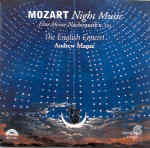The title of this exceptional disc, “Night Music”, should not be taken to mean that the performances are in any way dark, mysterious, droopy, sluggish, or otherwise conventionally “nocturnal”. Rather, the term evokes its 18th century musical meaning: a time for fun, relaxation, parties, entertainment both indoors and out, and of course, romance. Indeed, “Romantic” is perhaps the best way to describe these virtuosic, impulsive, and extravagantly expressive performances by the inimitable Andrew Manze and his team of crack “authentic-instrument” players.
Eine kleine Nachtmusik kicks off the evening in zesty style, with slashing attacks and a powerful sense of forward impetus: no effete mincing here. Manze’s subtle tempo modifications (listen to the opening movement’s very first piano phrase for an excellent example) and underlining of phrases bespeaks great care and preparation, but he never veers over the top into mannerism. The richly expressive Romance, lively minuet, and dazzlingly swift finale offer a fresh take on music that you’ve probably heard a million times–and thoroughly justifies listening to performance number one million and one. The same holds true for the Serenata notturna, where the addition of timpani gives the music grandeur as well as charm. The finale, with its “Hallelujah” Chorus interjections, makes a particularly bold and unforgettable impression in this performance.
Coming last, Manze and team offer what strikes me as the finest performance of A Musical Joke ever recorded. Certainly, the work makes its points if you play it “straight”, but Manze takes the lunacy to a whole new level. First of all, he understands that in this work the two horns are the musical equivalent of dangerous weapons. In the second half of the minuet’s “A” section, for example, he has the horns play correct harmony, only switching to Mozart’s foul original at the repeat, where everyone slows down in disbelief at the atrocious results and the ensemble begins to fall apart in shock. It’s hilarious and entirely in keeping with the spirit of the piece. Similarly, his solo turns in the same movement’s trio and his psychotic take on the slow movement’s cadenza offer laughs that never turn crude but remain perfectly believable examples of incompetent excess. The finale flies by at a frantic pace–and goes completely insane at the end. It’s an absolutely brilliant performance in every respect.
Adding to the attractions of the major work is a remarkably intense performance of the grim Adagio and Fugue in C minor K. 546, featuring a gratifyingly firm bottom to the string orchestra, while the tiny Menuet and Trio in C K. 485a serves as a palate-cleaning interlude between the former piece and the Serenata. Whether you listen in SACD surround or conventional stereo, you will be rewarded with supremely natural, tactile, and warmly focused recorded sound. Excellent internal balances, rich bass, and an open but never shrill top project the music so that nothing comes between you and a visceral experience of the music itself. Certainly this is one of the most memorable Mozart discs to appear in many years. Essential! [8/30/2003]
































